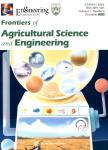Optimizing nitrogen management in the food system for sustainable development: a case study of Quzhou County
作者机构:College of Resources and Environmental SciencesNational Academy of Agriculture Green DevelopmentState Key Laboratory of Nutrient Use and ManagementNational Observation and Research Station of Agriculture Green Development(QuzhouHebei)China Agricultural UniversityBeijing 100193China Water Systems and Global Change GroupWageningen University&Research6700 AA Wageningenthe Netherlands Environmental Systems Analysis GroupWageningen University&Research6708 PB Wageningenthe Netherlands Key Laboratory of Agricultural Water ResourcesHebei Key Laboratory of Soil EcologyCenter for Agricultural Resources ResearchInstitute of Genetic and Developmental BiologyChinese Academy of SciencesShijiazhuang 050021China College of Resources and Environment ScienceHebei Agricultural UniversityBaoding 071001China
出 版 物:《Frontiers of Agricultural Science and Engineering》 (农业科学与工程前沿(英文版))
年 卷 期:2024年第11卷第1期
页 面:113-121页
核心收录:
学科分类:120301[管理学-农业经济管理] 12[管理学] 1203[管理学-农林经济管理] 083305[工学-城乡生态环境与基础设施规划] 08[工学] 09[农学] 0903[农学-农业资源与环境] 0833[工学-城乡规划学]
基 金:supported by the National Natural Science Foundation of China (42175137) the Major Science and Technology Project of Yunnan Province (202202AE090034) the China Scholarship Council (201913043) Hainan University the High-level Team Project of China Agricultural University
主 题:Agriculture green development food system multi-objective nitrogen management
摘 要:Nitrogen(N) is an essential nutrient for food production. The rapid increase in population requires high inputs of N to meet the growing food demand. If not managed well, the substantial loss of N from the food system has multiple impacts on grain yield, air and water pollution, and the economic benefits of agricultural. Multi-objective(food security, environmental sustainability and economic sustainability) synergistic consideration of N management in the food system is still lacking. This study employed strategies for optimizing N management in the food system, using Quzhou County as a typical example on the North China Plain. Firstly, a food chain approach was adopted to understand drivers and reasons behind N losses from the food ***, a top-down approach was used to define multi-objective N management, taking into consideration food security, environmental sustainability and economic sustainability. Multi-objective N management aims to reduce N losses to the environment and increase N use efficiencies,while simultaneously increasing yields and economic benefits. Thirdly, 3R(reduce-retain-recycle) N management strategies were identified for specific crops and animals through a bottom-up approach and then analyzed the potential of these strategies to achieve the multi-objectives. Finally, there is a discussion of how to engage different stakeholders to promote the technologies implementation. This study provides new insights into the synergistic achievement of multi-objective N management in the food system and the development of environmentally-friendly agriculture.



